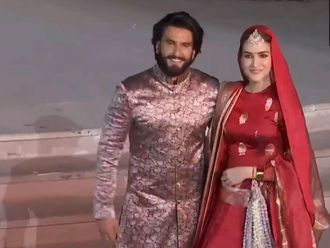|
|
Age of Anger: A history of the present |
By Pankaj Mishra, Farrar, Straus and Giroux, 416 pages, $16 |
Not long after the 1989 fall of the Berlin Wall and the collapse of the Soviet Union, the neoconservative American political scientist Francis Fukuyama published ‘The End of History and the Last Man’, which declared that liberal democracy was triumphing all over the world and would become the final form of human government, bringing history to an end. Its success would be driven by the inevitable victory of market capitalism, then sweeping across the former state-socialist economies of Russia and eastern Europe. Contrary to what some of Fukuyama’s critics maintained, the model for a post-historical world was not the United States but the European Union, largely because it represented the triumph of law on a transnational basis, subjecting individual states to a higher principle of reason.
Fukuyama did not expect these developments to happen immediately. The triumph of market-capitalist democracy would take time, maybe decades or even centuries, but it would continue inexorably until every other form of government had been eliminated, to the benefit of everyone.
However, in the quarter-century since ‘The End of History ...’, as the Indian essayist and novelist Pankaj Mishra argues, almost everything that has happened suggests that the market-oriented democratic state has begun to falter. We have seen not the steady spread of representative constitutional democracy but a “universal crisis” caused by the social, economic and political disfranchisement of huge numbers of people, marginalised by the ruthless search for profit of a global capitalism largely freed from the constraints of state regulation.
Social solidarities have broken down, leaving vast masses of atomised individuals whose resentments have found expression in a growing repudiation of the shibboleths of the neoliberal western political order.
“After a long, uneasy equipoise since 1945,” Mishra says, “the old west-dominated world order is giving way to an apparent global disorder.” We have entered an “age of anger”, in which established forms of authority and legitimacy, already seriously weakened by the forces of globalisation, have been challenged by history’s losers. We are experiencing “endemic and uncontrollable” violence, fuelled by a range of hatreds — of “immigrants, minorities and various designated ‘others’” - that have now become part of the political mainstream. In response, there is “a global turn to authoritarianism and toxic forms of chauvinism”. Societies organised for the interplay of individual self-interest mediated by the state have plunged into tribalism and nihilistic violence. To Fukuyama’s Panglossian vision of the future, Mishra opposes a nightmare.
Or at least, that is the implication of this stimulating and depressing book, for Mishra doesn’t really offer any solution to our present predicament. His purpose, rather, is to locate it in the longer-term context of the effects of the Enlightenment, imperialism and world industrial revolution as the process of “modernisation”, born in Europe, and took hold in Africa, Asia and Latin America. Non-western cultures began to transform along western lines. Yet “the history of modernisation”, Mishra insists, rather than being the rational and ordered process described by the US originators of the term in the 1950s and 1960s, “is largely one of carnage and bedlam”. Far from Nazi Germany, fascist Italy and Stalinist Russia being monstrous aberrations, they were in many ways its characteristic expressions.
Unwilling to confront these realities, western elites have panicked, taking refuge in Islamophobia, hatred of minorities and the destruction of civil liberties in a supposed clash of civilisations in which they are succumbing to the same forces of anger and hatred that are the mobilising forces behind the uprising of modernisation’s victims. Thus we are descending into the violent maelstrom of a “global civil war” between the elites who enjoy “modernity’s choicest fruits” while disdaining older truths, and the uprooted masses who, on finding themselves cheated of the same fruits, recoil into “cultural supremacism, populism and rancorous brutality”.
We are seeing this conflict played out, he argues, in a variety of ways, from the populist revolt that brought Brexit to Britain and Donald Trump to the White House to the fanaticism that has wrought terror in Europe’s cities and sparked civil war in the Middle East. Populist and authoritarian leaders have come to power in Hungary, Poland, Russia, India and Turkey, using hatred of immigrants and religious minorities to stay there, and bringing the power of the state crashing down on anyone who dares to criticise them.
How did this come to pass? Mishra looks to the history of ideas for an explanation, spending many chapters tracing a line of thought from Rousseau through the Romantics and the Russian nihilists to D’Annunzio and the anti-intellectual revolt of the fin de siecle and the early 20th century. But is this really convincing? Many of the parallels he draws between radical Islamic thinkers and European critics of Enlightenment rationalism seem strained, to say the least. Claiming that Kemal Ataturk, the secularising leader of post-Ottoman Turkey, decreed the abolition of the fez “as though acting out Voltaire’s intolerance of uncivilised Turks” doesn’t demonstrate a link between the two at all.
And none of this in the end actually explains the crisis Mishra has identified. There are many problems with his argument, not least its almost total neglect of Marxism and social democracy as alternatives to and critics of the liberal and neoliberal economic and political order. Above all, long stretches of the book represent what the Germans call Ideengeschichte, a method of approaching the past that treats prominent, “big-name” thinkers as representatives of wider historical trends and interprets the present through a genealogy of their writings instead of situating them in the material and cultural context of their own time.
It’s hard to see the relevance of Mishra’s lengthy discussion of Rousseau to the politics of the present day. For one thing, he ignores the two ideas for which Rousseau is best known — the social contract, something modern populists implicitly disavow, and the general will, the expression of direct democracy, to which one might imagine they were more sympathetic. For another, one can’t imagine populist politicians knowing the first thing about Rousseau or Bakunin. The discontents of the dispossessed are fundamentally economic, and to a degree cultural, assertions of the politics of identity in the face of globalisation, and it is a pity that he did not focus more sharply on these.
And what is all this meant to explain? Mishra lumps together the radical violence of the Daesh and extremism with the rise of Trumpism and the populist, anti-immigrant right, although they are differing phenomena that in the end require differing explanations. His sweeping rhetoric ends up by hugely exaggerating the dimensions of the problem he’s trying to explain. He wants, he says, to find out why the Daesh “became a magnet for young men and women in western democracies”. But it hasn’t, except for a tiny minority.
Democracy has spread since the fall of communism, above all in Africa and Latin America, two parts of the world about which Mishra has little to say. Life expectancy, literacy and other measures of prosperity have increased. Populism, Islamophobia, racism and anti-immigrant prejudice may be more loudly articulated than 10 years ago and enjoy more support in a number of countries, but Brexit was voted for by only 37 per cent of the British electorate, and Trump lost the popular election in the US by more than two million votes. The anti-immigrant Alternative for Germany only has significant support in the former East German states where the roots of democracy are shallow. Popular resistance to the authoritarian and misogynistic policies of the Polish government is strong. The future is not as bleak and as hopeless as Mishra thinks.
Of course, it is right to point to the downside of “modernisation”, however the term is conceived: in particular the violent and sometimes genocidal impact of European imperialism on other parts of the world in the 19th century, and the poverty and exploitation engendered by industrialisation. If 19th-century Europe was generally peaceful, its peace was punctuated by episodes of extreme and bloody violence. But history is a many-sided phenomenon. It cannot in the end be made to serve the interests of explaining the present through the vast and questionable arguments Pankaj Mishra puts forward in this thought-provoking book.
* Richard J Evans’s latest book is The Pursuit of Power: Europe 1815-1914, a volume in the Penguin History of Europe.
—Guardian News & Media Ltd









